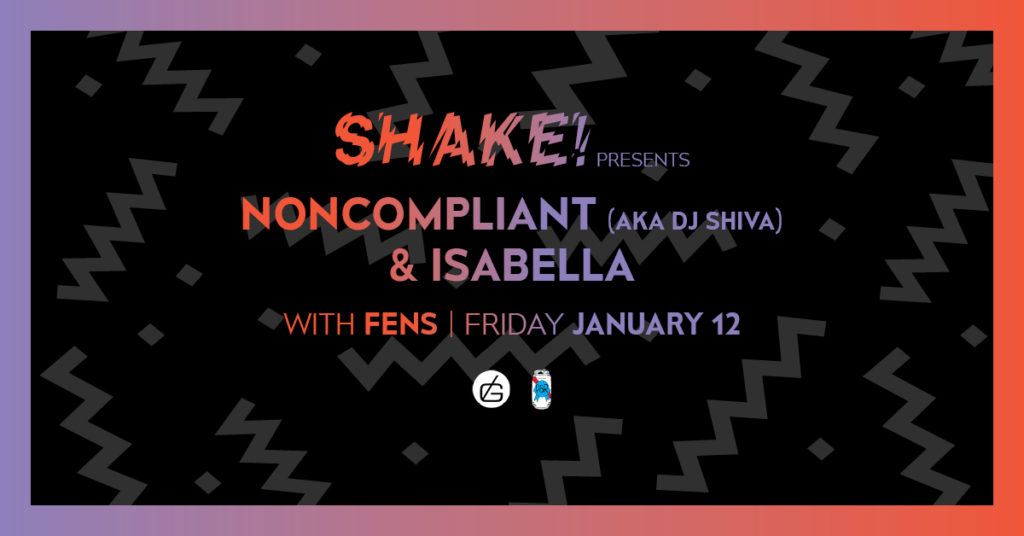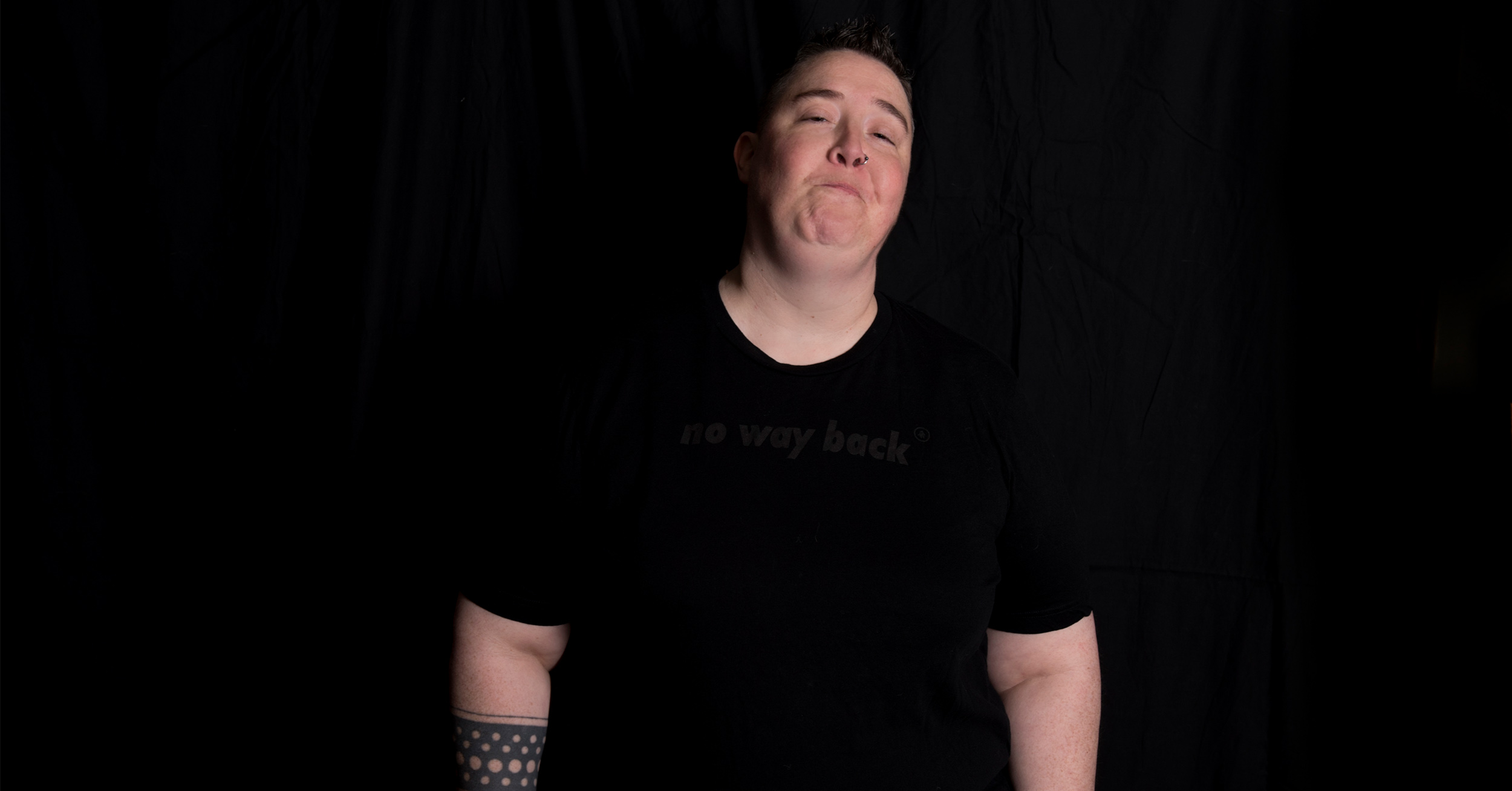Social media’s influence on the music sphere is an oft-discussed topic, sometimes with bitter undertones: has online personality come to supersede ability as a producer, DJ, or performer?
It’s no secret that Noncompliant aka DJ Shiva has a strong voice and isn’t afraid to use it, but she’s got the DJ and producer chops to back it up. And she’s much more than a “Twitter personality” — she’s proof that these channels can be strong networks for marginalized people, and that social media can be used to shape discourse and fight heteropatriarchal power within music scenes and within this fucked up world.
In advance of Noncompliant’s show with Boston staple Isabella and Shake! Resident Fens, we interviewed her about Midwest techno, her recent jaunt in Europe, and some of her tips for growing and thriving in dance music.
Interview by Alyce Currier (aka Lychee)
Photo by Seze Devres
Growing up in the midwest, what were some of the first experiences that shaped you musically?
Duran Duran, Depeche Mode, Prince, Michael Jackson, and Madonna on the radio.
When did you realize you yourself needed to start DJing and/or producing?
I have never been a spectator. Each new musical thing I loved, I had to be DOING, not just listening. I loved classical, so I learned violin. I learned guitar and bass to play various things (from pop to rock to punk). So turntables were just another instrument to learn to be a part of the music. Production came after. But it is all part of the same consistent mentality of active engagement with music I love.
Your new moniker Noncompliant came from the comic Bitch Planet. Can you tell us a bit more about the shift to this new name?
There are various reasons, but the main one was I wanted to do a pseudonym to play with some feminist concepts while being anonymous (techno pseudonyms and anonymity are kind of a thing). I decided to drop the anonymity and just switch it altogether. I also had shifted from a software-based studio to a hardware one, which changed my creative approach in the studio, and that seemed as good a time as any to do a full shift.
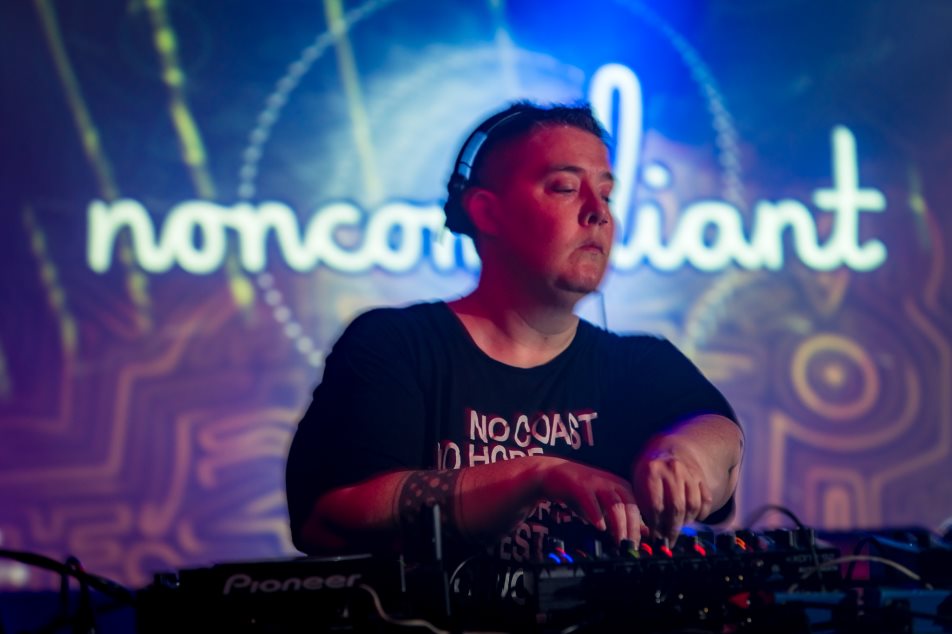
You seem to draw a lot of artistic influence from sources outside of music, for example, naming track titles for literary references and naming your gear after sci-fi characters. How do other realms of art shape your musical output? What are some recent books, movies, etc. you’ve been inspired by?
I’m not sure how they shape my musical input, except that things like scifi and space stuff and movies and books are so interwoven with how I experience life that they’re bound to creep in. I mean, you can’t watch scifi movies with iconic scores like Star Wars or Bladerunner or Terminator without acknowledging how formative that music was to generations of people, and how it connected futurism to music. I’ve always loved scifi films and TV and books and it’s just… ever-present in my mind, I think.
Recent inspirations: The Handmaid’s Tale, Black Mirror’s “San Junipero” episode, queer lady characters in TV/film, Delia Derbyshire
You’ve spoken a lot in past interviews about the struggles of growing up in the midwest, especially as an outspoken queer woman. For others who find themselves in scenes that might feel oppressive, artistically or otherwise, what advice would you have for sticking it out and manifesting the culture you want to see?
Never let the bastards grind you down.
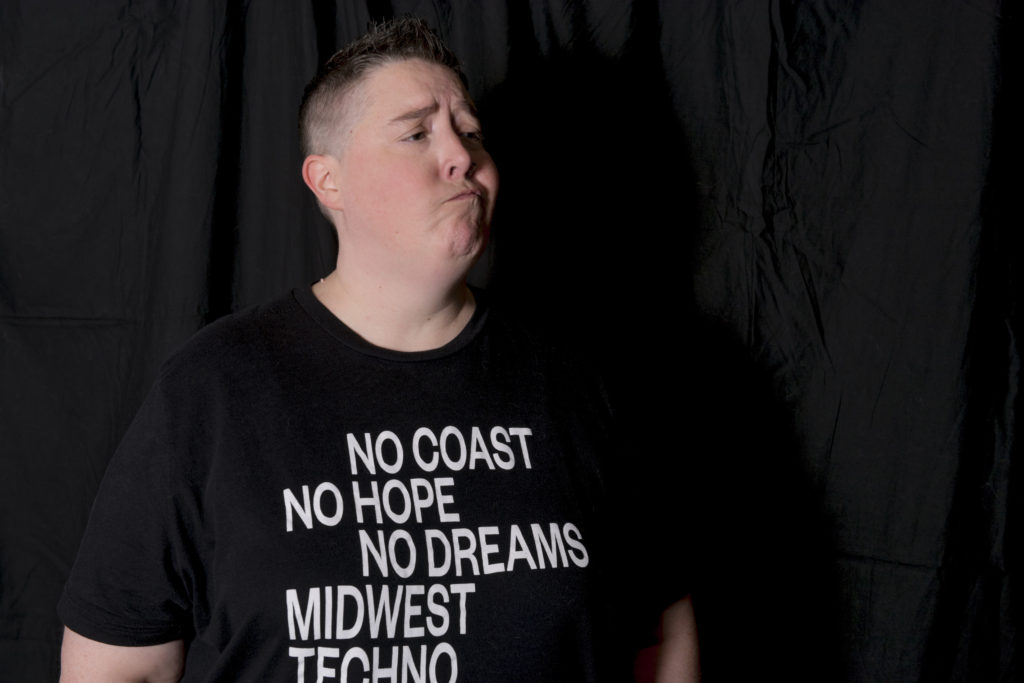
Photo by Seze Devres www.sdphotography.net
As someone who’s been DJing for a long time now, how do you make sure you’re still challenged by it? How do you keep pushing yourself and learning?
I have learned a lot of the new tech (Serato, using Ableton and controllers, CDJs) and just understanding these things and trying to find new ways to do things keeps me pretty entertained. My current goal is to really learn how to play with CDJs and really drill down into what is possible with them.
Things like Ableton or Traktor can get really into the weeds and so overly technical that sometimes it’s nice to just have the limitations of “this box can do this and that’s all, but what it can do is cool.” That’s really what DJing on turntables was like, which is how I am approaching learning CDJs. Each time there is a technical advance, that means there are new things to learn and try, and add to my repertoire as a DJ. Also, I get bored easily, so I am always trying new things just to challenge myself.
You’ve played a ton of amazing events in the last year all around the world; what were some of the ones that stuck out most for you personally and what made them special?
Hard to talk about this without talking about Panorama Bar/Berghain. If I never played another gig, those two would be what I was working toward for 21 years. Also, DeSchool in Amsterdam was a dark basement experience of the best kind. Unter NYC was indescribably fun. Into the Woods in LA was a wild, sweaty warehouse jam. Boiler Room in Detroit to open Movement weekend. There have been some fantastic ones this year!
What’s unique about American dance music, and specifically dance music from the Midwest? How would you define “Midwest Techno,” and how is it different for you playing in the U.S. vs. touring in Europe, etc.?
Midwest techno, to me, is stripped down, raw, machine funk. Mechanical enough to satisfy my love for robots and spaceships, groovy enough for me to shake my ass, and bouncy enough to not sound like a funeral dirge.
American dance music is always an uphill battle because American culture just doesn’t have the same relationship to dance music as Europe seems to. Culturally, we are used to song-by-song radio, not mixes. We are ruled by pop and rock, even though most of the modern pop producers are pulling from techniques bred in dance music anyway.
Difference playing in the US vs. Europe is that, except for some of the larger cities, everyone is struggling against the fact that electronic music, especially techno, is still mostly unheard of by most people. You get requests for pop music if you try to play techno at quite a lot of clubs in smaller cities. You can do one-off events, but you will likely pull less than 100 people and those people will all mostly be friends of the DJs.
What are some of the biggest challenges facing the techno world right now, specifically the realm of queer techno and for marginalized groups? Do you have any thoughts on actions promoters, performers, etc. should be taking to move things forward?
I think safety is always the number one thing. Marginalized people can’t enjoy the music and be present if they don’t feel safe. We have to be thinking about how we can make these spaces where we go to enjoy music safer for everyone, and that means promoters, clubs, artists, agents…everyone has to take that seriously.
We need actual policies for these places/people, with stated repercussions for bad actors, and FOLLOW THROUGH.
And honestly, if we could stop acting like alcohol and drug-fueled excess is the pinnacle of the electronic music experience, perhaps we could start to acknowledge that those excesses fuel some really fucked up, unsafe, non-consensual behavior that affects a lot of people. I am so bored with selfish hedonism. I’m not against alcohol or drugs, by the way. But if you have to be so fucked up you’re drooling on yourself or hurting other people, then you’ve lost the plot.
What are you looking forward to in 2018? What are some of your goals for the next year?
I am looking forward to playing more places, having some new music coming on wax for the first time in years, and having on of my tunes on the next Berghain mix (!!!). My goals are to make more time for making new music and hopefully re-wiring my studio so it’s not a hot mess. Also, working my butt off for midterm elections and kicking all the sycophants out of office.
See Noncompliant with Isabella and Fens at Good Life on Friday, January 12th. More info here!
